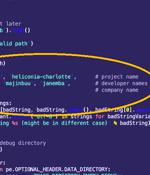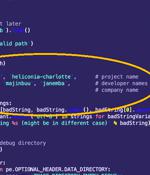Security News

The flaw was patched as an actively exploited zero-day bug in the Google Chrome web browser on Friday for Windows, Mac, and Linux users. In a security advisory published right before the weekend, Google said it "Is aware of reports that an exploit for CVE-2022-4262 exists in the wild."

It's just under two weeks since Google rushed out a Chrome patch for the then-current version 107 to seal off a bug that was already being used in real-life attacks. How might the bug might be triggered? Was merely viewing a booby-trapped web page enough? Could it be abused for remote code execution? Could the crooks end up installing malware without any visible warning? Who was using it? Were they state-sponsored attackers, or some other sort of cybercriminals? What they were after? Were they into data stealing, ransomware attacks, unlawful surveillance, or all of those things?

Search giant Google on Friday released an out-of-band security update to fix a new actively exploited zero-day flaw in its Chrome web browser. The high-severity flaw, tracked as CVE-2022-4262, concerns a type confusion bug in the V8 JavaScript engine.

Google has released Chrome 108.0.5359.94/.95 for Windows, Mac, and Linux users to address a single high-severity security flaw, the ninth Chrome zero-day exploited in the wild patched since the start of the year.This update was immediately rolled out to our systems when BleepingComputer checked for new updates from the Chrome menu > Help > About Google Chrome.
Google's Threat Analysis Group said on Wednesday that its researchers discovered commercial spyware called Heliconia that's designed to exploit vulnerabilities in Chrome and Firefox browsers as well as Microsoft Defender security software. The three components perform the following functions: Heliconia Noise is a web framework for deploying an exploit for a Chrome renderer bug followed by a sandbox escape; Heliconia Soft is a web framework that deploys a PDF containing a Windows Defender exploit; and Files is a set of Firefox exploits for Linux and Windows.

A Barcelona-based surveillanceware vendor named Variston IT is said to have surreptitiously planted spyware on targeted devices by exploiting several zero-day flaws in Google Chrome, Mozilla Firefox, and Windows, some of which date back to December 2018. "Their Heliconia framework exploits n-day vulnerabilities in Chrome, Firefox, and Microsoft Defender, and provides all the tools necessary to deploy a payload to a target device," Google Threat Analysis Group researchers Clement Lecigne and Benoit Sevens said in a write-up.

A Barcelona-based surveillanceware vendor named Variston IT is said to have surreptitiously planted spyware on targeted devices by exploiting several zero-day flaws in Google Chrome, Mozilla Firefox, and Windows, some of which date back to December 2018. "Their Heliconia framework exploits n-day vulnerabilities in Chrome, Firefox, and Microsoft Defender, and provides all the tools necessary to deploy a payload to a target device," Google Threat Analysis Group researchers Clement Lecigne and Benoit Sevens said in a write-up.

Zero-days are bugs for which there were zero days you could have updated proactively. Because cybercriminals not only found the bug first, but also figured out how to exploit it for nefarious purposes before a patch was prepared and published.

Google on Thursday released software updates to address yet another zero-day flaw in its Chrome web browser. Clement Lecigne of Google's Threat Analysis Group has been credited with reporting the flaw on November 22, 2022.

Google has released an emergency security update for the desktop version of the Chrome web browser, addressing the eighth zero-day vulnerability exploited in attacks this year.As users need time to apply the security update on their Chrome installations, Google has withheld details about the vulnerability to prevent expanding its malicious exploitation.